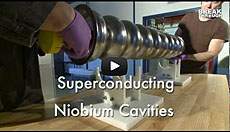Lab Breakthrough: Fermilab Accelerator Technology
 |
| View Fermilab's two-minute video on latest advancements in superconducting accelerator technology. |
Fermi National Accelerator Laboratory accelerator scientist Stuart Henderson took some time discuss the role of particle accelerators in basic science, manufacturing and our daily lives. There are more than 30,000 particle accelerators in use around the world.
Question: First off, for my mom in Ohio – what makes the breakthrough so exciting for her?
Stuart Henderson: Your mom might not know this, but particle accelerators aren't only used by scientists to discover the secrets of the universe. They are also put to work every day improving her quality of life. More than 30,000 accelerators are in use around the world, most of them in medicine and manufacturing. Particle accelerators treat cancer, cure inks on cereal boxes, sterilize medical supplies, create better shrink wrap, spot suspicious cargo, clean up dirty drinking water, and help design drugs. This breakthrough will help us to build better and more efficient accelerators in the future.
Q: What about your facility made it the right place for this discovery – whether colleagues, equipment or interdisciplinary collaboration?
SH: Fermilab has brand-new facilities that use the latest technology to test and improve the performance of particle accelerator components. Our team built on tests that had been previously carried out at other DOE National Laboratories and international laboratories, and then used custom-built equipment to modify a critical step in the manufacturing process for these components. The result is a more efficient and environmentally friendly way of treating the surfaces of these components.
Q: I know that work often builds from other work in a 'standing on the shoulders of giants' type of way. Are there any particular technologies or discoveries that act as a basis for your work?
SH: There are way too many giants to list here. This work is part of an international effort that started many years ago. Over the last 10 years, Fermilab has developed the staff, the infrastructure and the know-how to become a world leader in this area, known as superconducting radio-frequency accelerator technology. The underlying technology relies on superconductivity, the discovery that at incredibly low temperatures many materials can conduct electricity without electrical resistance.
Q: What future needs will be met by more powerful accelerators?
SH: In addition to their applications in areas like medicine and manufacturing, accelerators are great discovery tools. By creating beams with more particles or by accelerating particles to higher energies, scientists can discover and explore new particles and forces, which provide for a better understanding of matter, energy, space and time.
Q: What other technologies are affected by the pursuit for a better (or more specialized) accelerator?
SH: Each different application of accelerators requires specialized technology. The needs of a security specialist scanning shipping containers are different from the needs of a doctor treating a cancer patient. Scientists are proposing to use this particular type of accelerator technology to treat and reduce the growing quantities of nuclear waste produced by nuclear power stations. Other scientists have proposed to use these superconducting accelerators to develop and operate nuclear reactors that are safer to operate, produce less long-lived nuclear waste, and can meet global power demands for at least 100 times longer than conventional technology.
Read more |